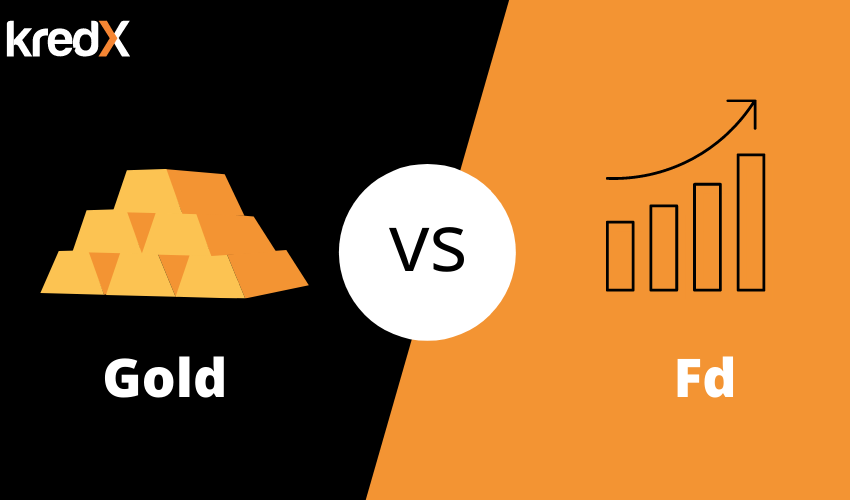
Gold vs FD: Which Investment Option to Pick?
When it comes to low-risk and stable return investment, gold – in the form of digital gold, gold ETFs, gold bonds – and Fixed Deposit (FD) as an investment instrument acquires the top position. Both these asset classes have distinctive characteristics that make them unique as well as ideal for risk-averse investors.
Whereas the gold price fluctuates constantly, FD guarantees fixed pre-set returns. Therefore, while determining which investment tool would fetch the maximum benefit in the long term, investors must have comprehensive knowledge.
Continue reading to know the intricacies of gold and FD to understand the best investment option among the two.
Gold
Gold is a sought-after asset in India and boasts considerable cultural significance. It is also widely popular as an investment choice, thanks to its risk-free nature.
Experts recommend diversifying a portfolio by dedicating at least 5-15% to gold, i.e. digital gold, gold ETFs, gold bonds, coins and bars, among others. While traditional investment methods like gold bars involve concerns regarding their purity & security, digital gold has emerged as an effective tool due to a 100% online procedure and lack of purity and security issues.
Key Benefits: Digital gold investment comes with a host of benefits that make them a profitable investment tool. These include –
- Digital gold offers a higher yield (if sold at the right time).
- It can be liquidated easily.
- It optimally hedges against inflation and other external factors.
- This form of investment involves transparent pricing and comes in the purest form (99.9% purity).
- It helps to diversify a portfolio.
- As an investment tool, digital gold can be easily tracked.
- Digital gold can be used as collateral for online loans.
Fixed Deposit
FD is a traditional investment option and is considered safer as it generates a fixed return on investment over a prespecified period. Fixed deposits generate higher returns than a savings account. Individuals can invest in fixed deposit by selecting a suitable amount and tenure and opening an account with a financial institution. This investment instrument does not get affected by market volatility.
Key Benefits: Below are discussed the inherent benefits of investing in fixed deposits.
- FD offers guaranteed returns.
- The returns from FD do not depend on market influences.
- FD comes with flexibility in interest payout, such as cumulative (the interest is accumulated and paid on maturity) and non-cumulative (payouts periodically as chosen by the investor).
- Senior citizens can enjoy a higher return on FD.
- Investors can avail a loan against Fixed Deposit.
- Under section 80C of the Income Tax Act, 1961, FD (with five years lock-in-period) helps investors save tax up to Rs. 1.5 lakh annually.
Now that investors have grasped a basic idea about the investment tools –gold and FD – and their benefits, a comparative analysis will further help them pick the right investment option.
| Parameter | Digital Gold | Fixed Deposit | |
| 1. | Flexibility in investing | Highly flexible | Flexible |
| 2. | Rate of Return | Gold has delivered a 9.8% annualised CAGR return in the last 30 years. | FD has yielded average 8% returns over the past 30 years. |
| 3. | Liquidity | Offers easy liquidity. | Offers limited liquidity and depends on the selected tenure. |
| 4. | Taxation | Returns on digital gold is taxable (20% on returns + surcharge + 4% cess) if held for more than 36 months. | Though it is a tax-saving instrument, the interest earned from FD is fully taxable. |
| 5. | Market Factors | Depends on the domestic and international political and economic conditions. Thus, its price fluctuates constantly. | Free of external or market factors. Hence, it guarantees a steady income. |
| 6. | Revenue Generation | Does not generate monthly revenue. Instead, it generates wealth over time. | Revenue generation depends on the sole discretion of interest payout selection (monthly or upon maturity). |
Things To Consider Before Investing In Gold or FD
- Know Your Risk Appetite: Low-risk investment offers low returns and vice versa. Both digital gold and FD are a low-risk investment. However, short-term digital gold investment often gets affected by external factors but always maintains its value in the long run. On the other hand, FD offers stable income depending on the tenure chosen. Therefore, investors must identify their risk appetite and choose accordingly.
- Investment Goal: Investors should have a clear investment objective to avoid making abrupt decisions.
- Term Of Investment: Digital gold comes with a tenure of 5 years but is flexible. At the same time, the tenure of FD can be between 7 days and 10 years. Digital gold investors can sell the asset any time after their purchase. On the other hand, individuals can withdraw cash before maturity from an FD account. However, they have to bear a penalty charge.
- Cost Of Investment: Before investing in digital gold (only have to pay delivery charges if anyone wishes to get physical gold) or FD (penalty charges for premature withdrawal), investors must know the key costs involved in both cases.
- Volatility & Returns: Investors must consider these two factors. Though digital gold is more volatile than FD, it guarantees high returns in stable market situations. FD offers steady income in any economic or political situation.
Bottom Line
Digital gold and Fixed Deposit both qualify as low-risk investment tools. While digital gold ensures high return at the expense of market volatility, FD guarantees low but steady returns and does not get affected by market factors. Hence, investors must select an investment option as per their suitability, profitability and also on the basis of the current market scenario.



